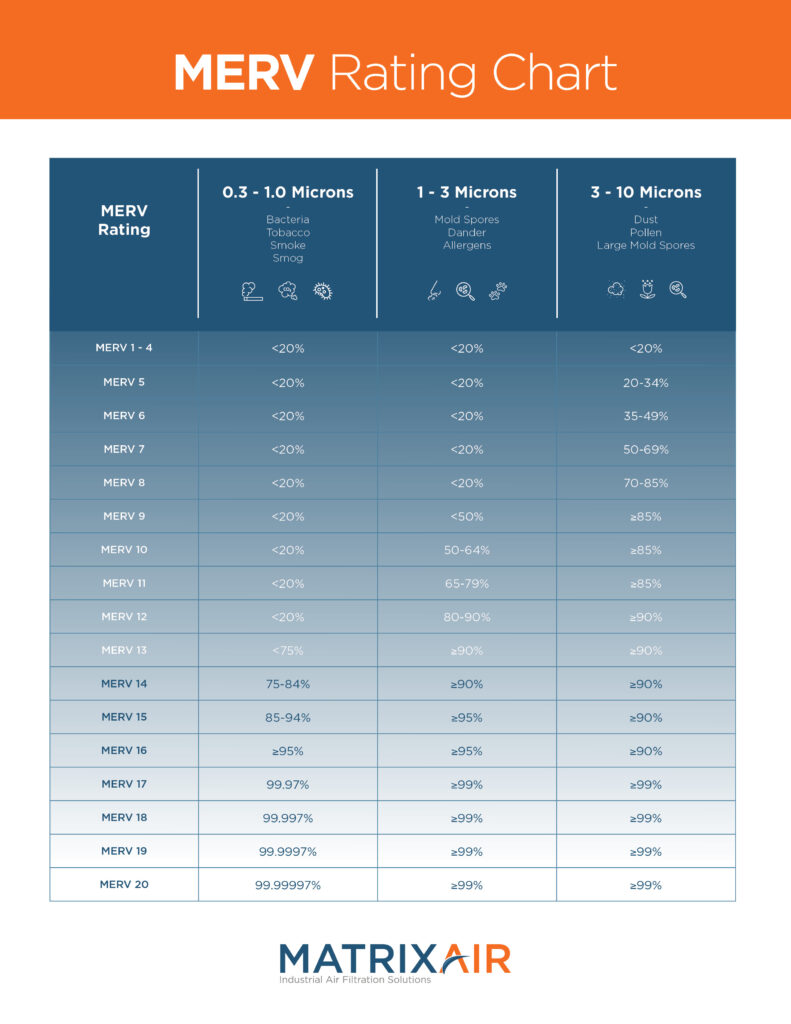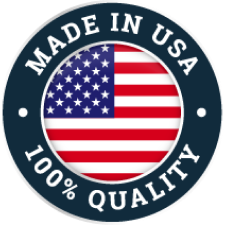Understanding MERV (Minimum Efficiency Reporting Value) ratings is crucial when choosing air filters for any environment, whether it be your home, office, or an industrial setting. This guide will help you understand MERV Ratings, what they signify and how they can impact indoor air quality.
MERV stands for Minimum Efficiency Reporting Value, a standard that rates the overall effectiveness of air filters. Higher MERV ratings indicate finer filtration, meaning more particles are trapped by the filter.
Filters are tested in controlled environments with particles of varying sizes. The ability of a filter to capture these particles determines its MERV rating. The ratings are assigned based on a filter’s worst-case performance at capturing particles ranging from 0.3 to 10 microns

Our chart breaks down the efficiency of filters across a range of MERV ratings:
Choose a MERV rating that matches your needs:
Health Benefits
Selecting the correct MERV rating can reduce pollen, dust mites, and other allergens in your environment, contributing to better respiratory health and overall well-being.
Efficiency and Cost
While higher MERV ratings provide better filtration, they also require more energy to pull air through the filter. Balancing air-quality needs with energy costs is essential for maintaining an efficient HVAC system.
HEPA (High-Efficiency Particulate Air) filters meet specific standards that are beyond the highest MERV ratings (MERV 17 and above). HEPA filters must remove at least 99.97% of particles that are 0.3 microns in size from the air passing through them, making them highly effective for medical settings and environments requiring extremely clean air.
Higher MERV rated filters often need to be changed more frequently because they trap more particles and can become clogged faster. Residential filters typically need to be changed every 90 days, while filters in high-traffic or industrial areas might need more frequent replacements.
While a higher MERV rating means better filtration, it can actually reduce HVAC efficiency if the system is not designed to handle such a dense filter. It’s important to use a filter that your system can manage without reducing airflow or overworking the system.
Using a filter with a MERV rating too high for your HVAC system can lead to increased resistance in airflow, which can make your system less efficient, increase your energy costs, and potentially lead to system damage due to the added strain.
Consider factors such as allergies, asthma, or other respiratory conditions among building occupants. Homes with pets or high dust levels might benefit from filters with higher MERV ratings. For most residential settings, MERV 7 to 12 provides adequate filtration without overly taxing the HVAC system.
Only in environments where ultra-clean air is critical, such as in hospitals or manufacturing cleanrooms. In typical residential or commercial settings, very high MERV ratings may not provide additional benefits and could increase costs and maintenance needs unnecessarily.
Yes, using a higher MERV rated filter can be beneficial during periods of poor outdoor air quality to better capture fine particulates and smoke. However, ensure your HVAC system can handle the higher-rated filter without compromising airflow.
Still have questions? Contact a MatrixAir expert today for personalized advice to find the perfect solution for your air quality needs.
